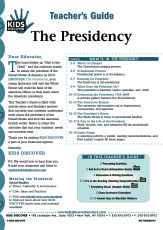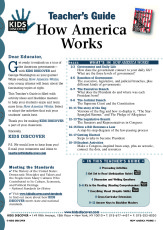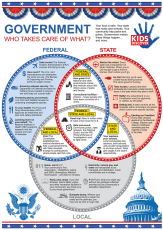John F. Kennedy was the 35th president of the United States and the youngest president ever elected. Tragically, he was assassinated in his third year as president. Although John F. Kennedy’s life and presidency were short, his legacy is long.
JFK was a war hero. In 1941, he volunteered to join the U.S. military. After Pearl Harbor was attacked by Japanese fighter planes, the United States declared war on Japan and Germany. In the Navy, JFK commanded patrol torpedo boats. Stationed in the Solomon Islands, JFK’s boat, PT-109, came under attack.
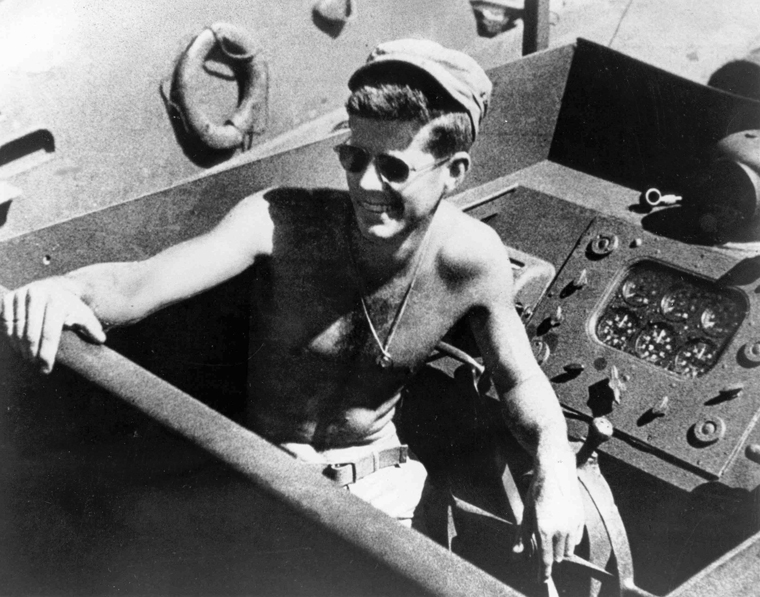
Two crew members were killed, and after clinging to the sinking wreck for several hours, JFK and the 11 others swam for three-and-a-half miles, with JFK towing a badly burned crew member by a strap held between his teeth. JFK injured his back but won several medals for bravery.
After the war, JFK ran for Congress from Massachusetts and in 1946, at the age of 29, he was elected as a Democrat to serve in the U.S. House of Representatives. He served three terms and then went on to be elected as senator from Massachusetts in 1952.
Things were also changing in JFK’s personal life. He was introduced to Jacqueline Bouvier (or Jackie) and within a short time, they were engaged and married. The next year, JFK needed two operations on his injured back. Jackie suggested he write a book during the time needed to recover from the surgery. The result was the best-selling book, “Profiles in Courage,” about eight U.S. senators throughout history who stood up for their beliefs and made a difference in the world.
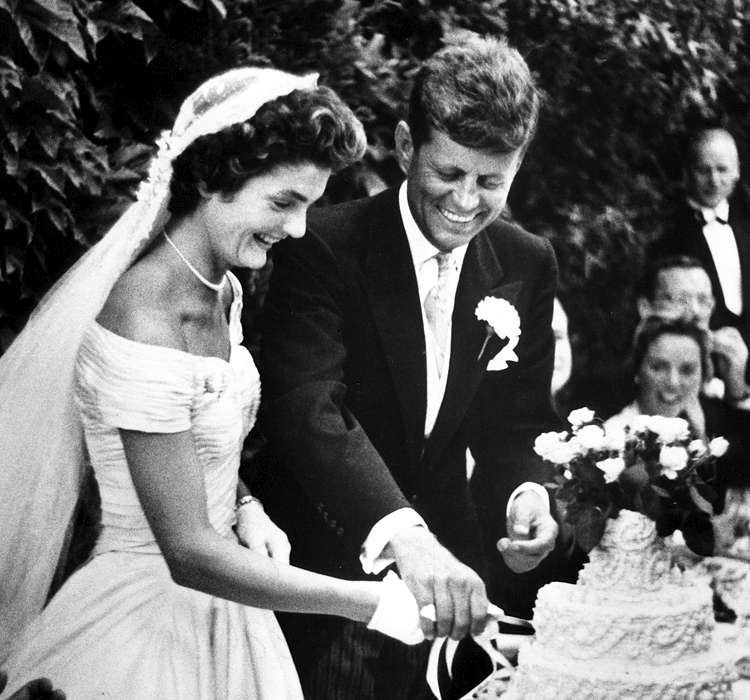
While JFK was in Congress in the late 1940s and 1950s, the United States became very prosperous. But it was also a tense time. After World War II, the United States and Soviet Union became the world’s two big superpowers but with very different forms of government. The United States was (and is) a democracy, with citizens electing their own leaders and with freedom of speech as one of the most basic rights. The Soviet Union was an authoritarian government with no popular vote. Both superpowers had nuclear weapons. For many years, the U.S. and Soviet Union were in a stand-off called the Cold War.
The Cold War strongly influenced JFK’s thinking. In 1960, JFK ran for president and when he received the Democratic Party nomination, he gave a speech about what he called the “New Frontier.” In the speech he said,
“We stand today on the edge of a New Frontier — the frontier of the 1960s, the frontier of unknown opportunities and perils, …
“Beyond that frontier are uncharted areas of science and space, unsolved problems of peace and war, unconquered problems of ignorance and prejudice, unanswered questions of poverty and surplus.”
His opponent from the Republican Party was Richard Nixon.
During the campaign, debates between the presidential candidates were shown on TV for the first time in history. These televised debates were crucial to JFK’s success. JFK looked like a movie star, well-rested, and brimming with health while Nixon had been recovering from a stay in the hospital and looked unwell.
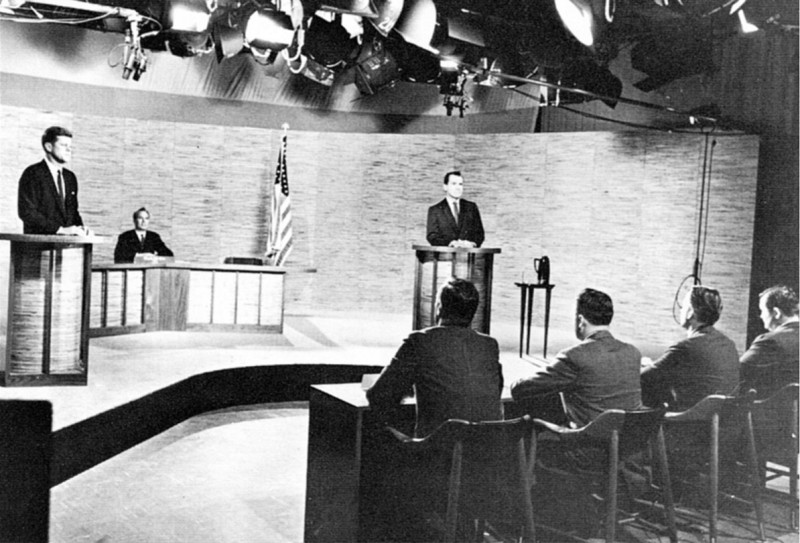
JFK was elected the 35th president of the United States and the first Catholic elected to the presidency. On the day of his inauguration, he gave a speech in which he called on Americans to perform public service. He said, “My fellow Americans, ask not what your country can do for you—ask what you can do for your country.”
At 43, JFK was the youngest president ever elected in the United States. He was charming, upbeat, and had a big toothy smile. His wife, Jackie, became famous for her fashion sense and her support of the arts. Their children, Caroline and John Jr, were little when the family moved into the White House. For many Americans, the young family symbolized the nation’s hopes for the future.
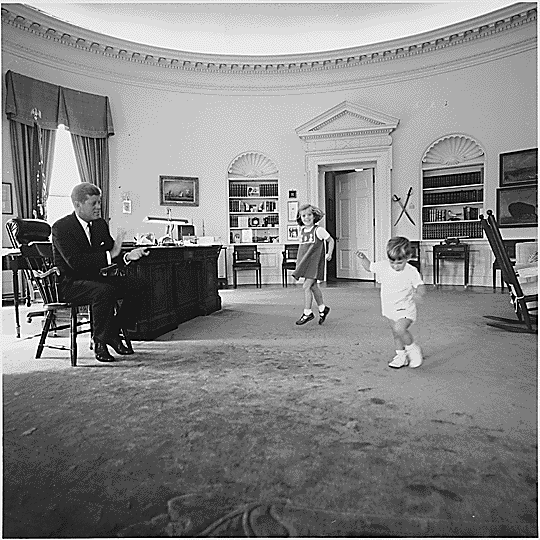
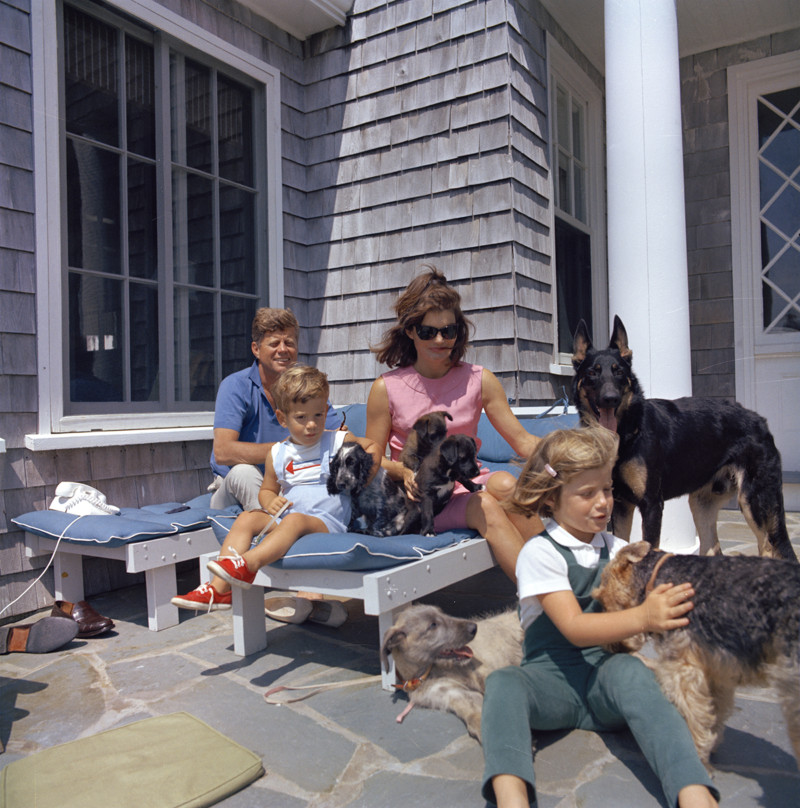
One of the first things JFK did was establish the Peace Corps, a government program that sent volunteers to developing countries. Tens of thousands of young Americans, inspired by the the Inaugural call to serve, signed up for the Peace Corps in the 1960s. They did things like help build clean water systems, schools, and worked on farming projects.
In 1961, JFK during a speech before Congress, called for the U.S. space program to put an astronaut on the moon before the end of the decade. Spurred by the fact that the Soviets had launched the world’s first satellite (Sputnik) AND beat America by launching the first human into space, JFK wanted to beat the Soviets to the moon. Soon the United States was sending astronauts into orbit.
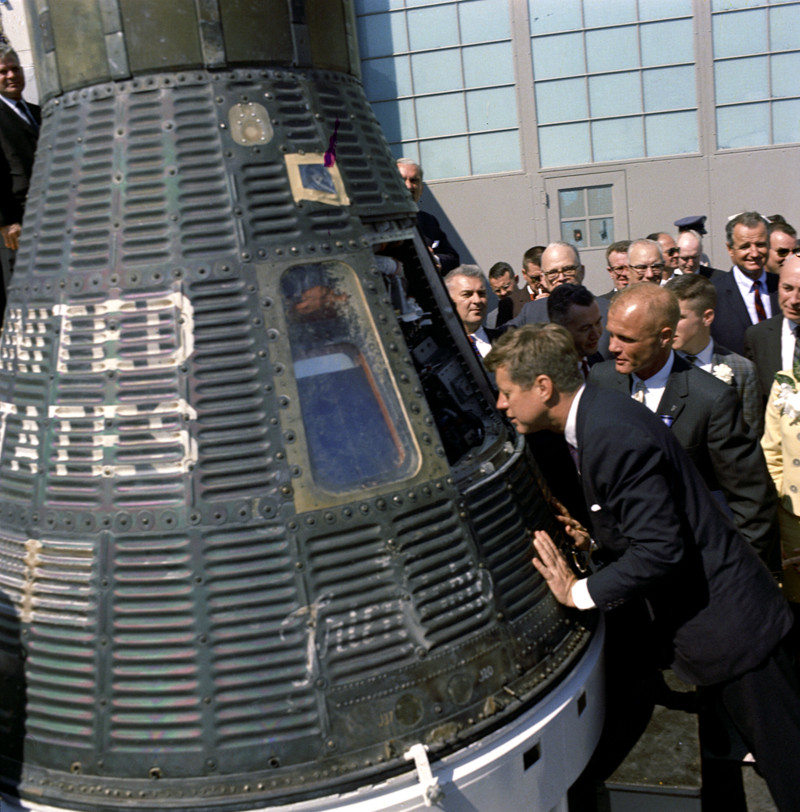
There was another reason the governments of the United States and Soviet Union were so keen on their space programs: satellites can be used for spying.
Both superpowers had nuclear weapons and there was a gnawing fear that global nuclear war could break out. This fear almost became a reality during the Cuban Missile Crisis. In 1962, a U.S. spy plane took pictures of a secret Soviet nuclear missile base being built in Cuba—not far from the coast of Florida. When the spy photos were shown to JFK, he and his staff had to think about what to do. Should the United States invade Cuba? If JFK did not handle this right, the Cold War could get very hot, very fast.
JFK pulled together a team of advisors and experts. Some of them wanted to bomb Cuba in a lightning strike. Others advised JFK to use the U.S. Navy to blockade Cuba. The blockade would stop any more supplies from getting to the missile base. JFK decided the blockade was the best idea. The crisis lasted 13 days—with a lot of tense back-and-forth negotiations. Finally Soviet Premier Nikita Khrushchev agreed to dismantle the Cuban missile base. In exchange, JFK secretly agreed to remove America’s nuclear missiles from Turkey, which were close to the Soviet border.
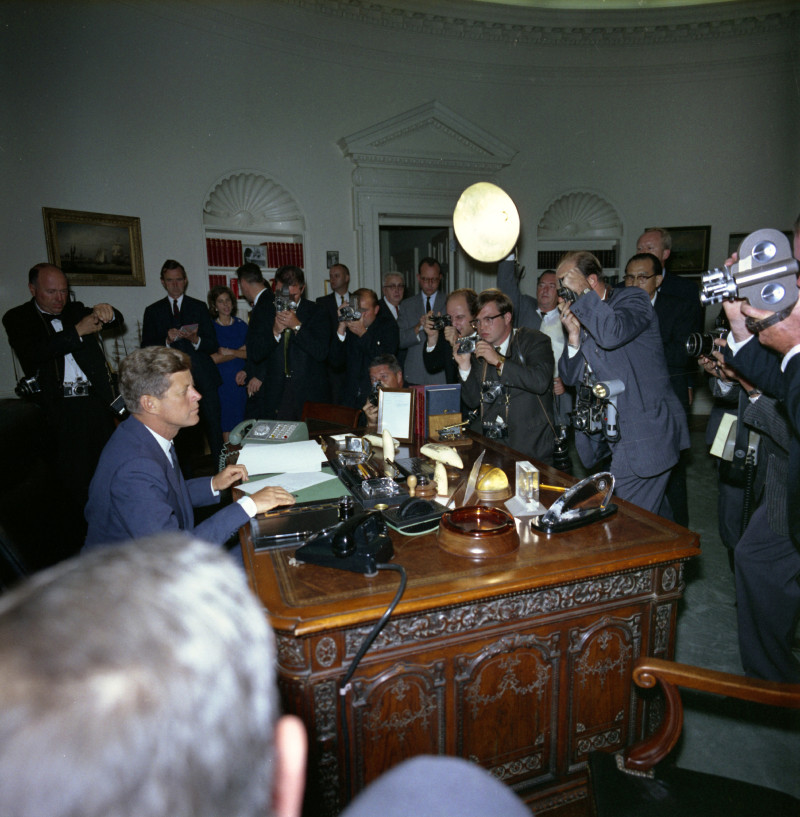
Another hot spot during the Cold War was Berlin. After World War II, Berlin had been divided up into sectors, leaving West Berlin as an outpost of democracy inside East Germany, a communist country. To stop people from leaving East Germany for the freedom of the West, the East German government built a wall surrounding West Berlin. JFK visited Germany in 1963 and gave a speech before massive crowds in which he famously said, “Ich bin ein Berliner.” It translated to “I am a citizen of Berlin.” Of course, he was not actually a citizen of Berlin. What JFK meant was that the freedom of the people of West Berlin was as important to him as his own freedom.
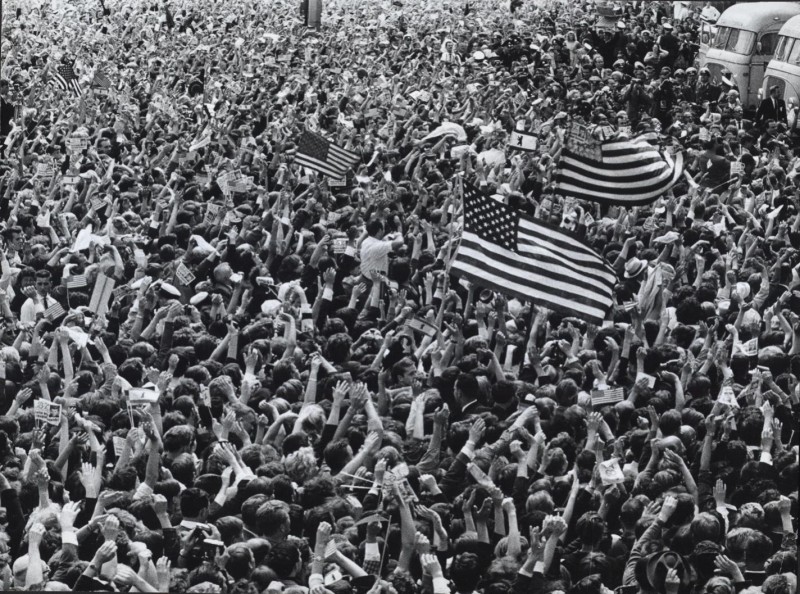
Although the Cold War went on, JFK and Khrushchev were both rattled by how close they had come to starting World War III during the Cuban Missile Crisis. After JFK’s Berlin visit, he, Khrushchev, and the leader of Great Britain signed a Limited Nuclear Test Ban Treaty. Taking one step closer to peace, they agreed that nuclear weapons would no longer be tested in the open air or underwater—where deadly radiation could spread.
During JFK’s presidency, hope was in the air, but there was still plenty of injustice. The U.S. Constitution says all American citizens must get “equal protection” when it comes to the law. But blacks did not have equal protection everywhere. There was a gap between American ideals and what was going on in real life. To protest discrimination and get equal rights, huge peaceful demonstrations and acts of civil disobedience were coordinated. These efforts were often met with opposition, arrests—and sometimes violence. JFK knew this was wrong. What was he going to do about it?
On June 11, after a federal judge ordered that three black students be admitted to the University of Alabama, the governor of Alabama, George Wallace, tried to physically block these students from entering the campus. President Kennedy ordered the National Guard to take over and the students were enrolled. That night, in reaction to the crisis in Alabama and inspired by the leaders of the Civil Rights Movement, JFK gave a speech on TV where he proposed important civil rights legislation.
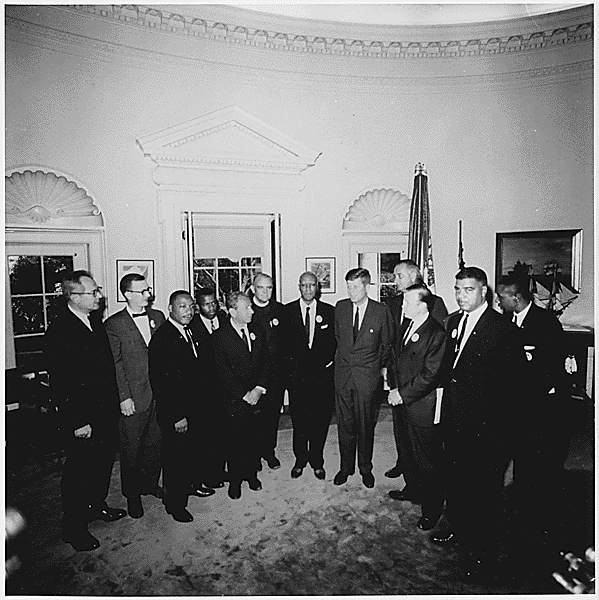
It had been an incredibly busy year for JFK. In November 1963, it was time for another trip. He and Jackie planned a tour of Texas. The short trip was going well when they arrived in Dallas on November 22, 1963. The streets were lined with well-wishers as JFK and Jackie rode in an open-air limousine.
The presidential motorcade rolled through the streets for half an hour, with the president and Jackie waving at people. When the motorcade turned into Dealey Plaza, shots rang out. The president had been assassinated.
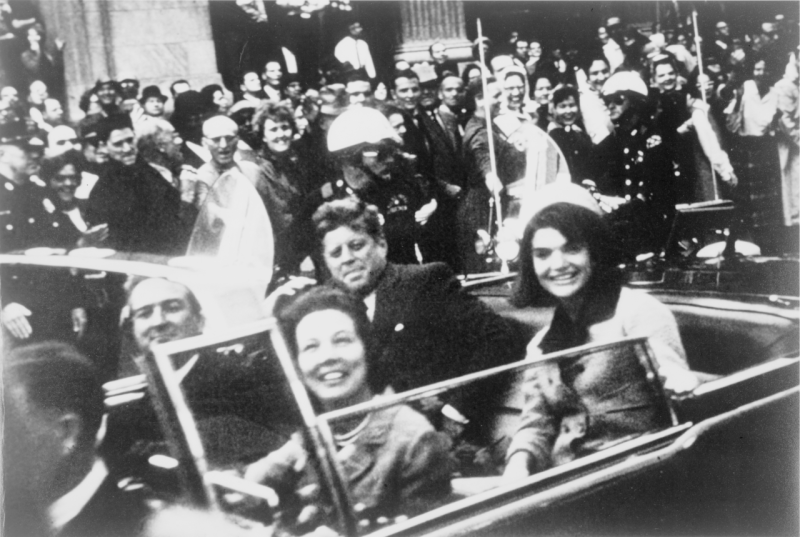
About an hour later, the alleged assassin, Lee Harvey Oswald was captured by police, hiding in a movie theater. Over the next 48 hours, Oswald denied killing JFK. Then, while being moved through the basement of a Dallas police station, he himself was fatally shot by Jack Ruby, a Dallas nightclub owner who had snuck in with a group of reporters. A special U.S. government panel (known as the Warren Commission) concluded that Oswald was the lone shooter. However, many theories swirl around JFK’s death to this day, and not everyone is persuaded by the Warren Commission’s findings.
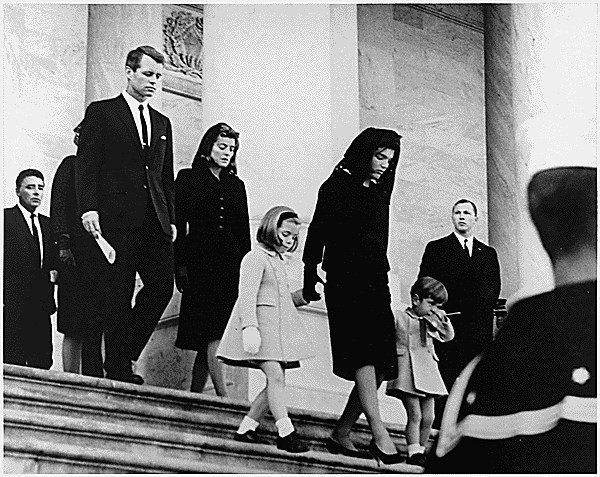
The nation, and the world, deeply mourned JFK’s death. Vice President Lyndon B. Johnson had been sworn in as president, and he continued many of JFK’s initiatives. The Civil Rights Act was passed the next year, and U.S. astronauts did fly to the moon and back before the end of the decade. At Arlington Cemetery, Mrs. Kennedy lit an eternal flame where JFK was buried to symbolize JFK’s never-ending hopes for American democracy and the struggle for peace, freedom, and equality around the world.
Written by Margaret Mittlebach
[wp-simple-survey-39]
